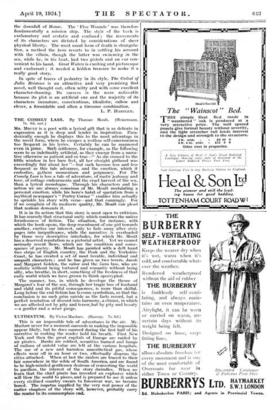MR. MOULT is a poet with a lyrical gift that
is as delicate in expression as it is deep and tender in inspiration. Para- -doxically, enough he displays this to the most advantage in the -novel form, 'where he escapes a restless self-consciousness too frequent in his lyrics. Certainly he can be mannered even in prose. Such sentences, for example, as the following seem -to us indefinably artificial, as they emerge from a narra- tive otherwise so patient and so true—" As she crossed to the little Window in her bare feet, all her straight girlhood was exceedingly fairl about her "—but such become- less and less frequent as this tale advances, and the emotion, which it embodies, gathers momentum and poignancy. For The
j
Comely Lass is less a tale of adventure, of rustic jealousy and love, of cottage endearments and the cruel harvest of the sea, than a lyrical monologue. Through his characters and his -action- we are always conscious of Mr. Moult modulating a personal. emotion, while his hero's habit of quotation from a mythical newspaper's Poetry Corner " enables him actually to sprinkle his story with verse--and that cunningly. For if we complain of its mediocre quality, Mr. Moult can plead that. realism, demands it.
It is in its action that this story is most open to criticism. It has scarcely that structural unity which 'condones the native formlessness of fiction. The situation, for instance, with which the book opens, the deep resentment of one girl`towards another, excites our interest, only to fade away after sixty pages into insignificance, while the narrative is overloaded by those very descriptive interludes, for which Mr. Moult has a deserved reputation as a pictorial artist. Yet we cannot -seriously resent flaws, which are the condition and conse- quence of poetry. • MT. Moult. has_ painted with a deft hand two strips of English country, the Peak and the Yorkshire -Coast, he has created a set of most lovable, individual and unspoilt eharaetees ; and .he-has- given -us two- lovers, Jacob and -Margaret Golden, the sailor and the farm_ lass, who are realistic without being tortured and romantic without being silly, who breathe, in short, something of the freshness of that early world which we have grown to think apocryphal.
The manner, too, in which he develops the theme of -Margaret's fear of the sea, through her-tragic loss of husband 'and child and its pitiful consequences, is more than skilful. Long before the end fiction has become symbolism, so that the Conclusion is no such grim suicide as the facts record, but a perfect resolution of discord into harmony, a climax, in which we are affected not by pity and terror, but by pity and beauty —a gentler and a wiser purge.


































 Previous page
Previous page